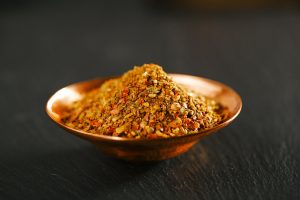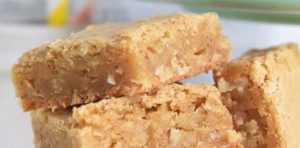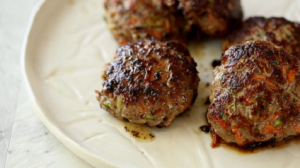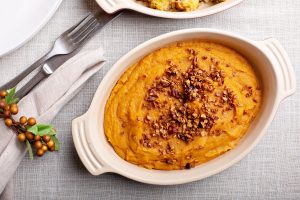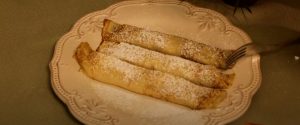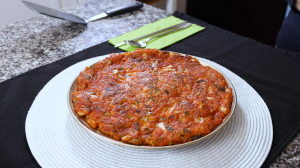This versatile dried herb salad seasoning recipe is a game changer for salad lovers. It's not just a blend, but a perfect ensemble of well-balanced flavors. The dried herbs keep the seasoning fresh for longer while the Parmesan gives it a creamy, rich edge. Elevate your salads with this homemade seasoning, it's a pinch of this and a dash of that, creating a symphony of flavors in every bite.
Photos of Dried Herb Salad Seasoning Recipe
The ingredients for this recipe are pretty straightforward and commonly found in most households. However, if you don't have dried marjoram on hand, you can easily find it in the spices section of your local supermarket. Remember, dried herbs have a more concentrated flavor compared to the fresh ones, so adjust the quantity to your taste.
Essential Ingredients for Dried Herb Salad Seasoning
Parmesan cheese: This hard, granular cheese will add a nutty flavor and creamy texture to your seasoning.
Dried parsley flakes: Adds a slight peppery flavor with a hint of bitterness.
Dried basil: Its sweet, mild flavor and aroma are essential in our blend.
Dried chives: They have a mild onion flavor that complements the other herbs.
Dried marjoram: Similar to oregano but sweeter and more delicate.
Paprika: Adds a bit of heat and color to the blend.
Onion powder: Adds a savory depth to your spice blend.
Garlic powder: Brings a warm, earthy flavor.
Salt: Balances out the flavors.
Black pepper: Adds a spicy kick to the blend.
One reader, Gustav Lor says:





This dried herb salad seasoning recipe is a game-changer! It adds a burst of flavor to my salads, making them incredibly delicious. The blend of herbs and spices is perfect, and it's so easy to make. I highly recommend it to anyone looking to elevate their salad game!
Techniques Required for Making Dried Herb Salad Seasoning
How to store the seasoning: Store the dried herb salad seasoning in an airtight container in a cool, dry place to maintain its flavor and aroma.
How to use the seasoning: Sprinkle the dried herb salad seasoning on salads, roasted vegetables, grilled meats, or pasta dishes to add a burst of flavor and aroma.
How To Make Dried Herb Salad Seasoning
With parmesan cheese, dried herbs, and paprika, level up your salad recipes with this dried herb salad seasoning for extra layers of flavors.
Serves:
Ingredients
- ½cupparmesan cheese,grated
- 1tbspdried parsley flakes
- 2tspdried basil
- 2tspdried chives
- 2tspdried marjoram
- 2tsppaprika
- 2tsponion powder
- 2tspgarlic powder
- 2tspsalt
- ½tspfreshly ground black pepper
Instructions
-
Combine the Parmesan cheese, parsley flakes, basil, chives, marjoram, paprika, onion powder, garlic powder, salt, and pepper in a small bowl, then stir to blend evenly.
-
Use as desired and enjoy.
Recipe Notes
Store in an airtight container.
Nutrition
- Calories: 356.00kcal
- Fat: 20.17g
- Saturated Fat: 12.40g
- Monounsaturated Fat: 5.73g
- Polyunsaturated Fat: 0.93g
- Carbohydrates: 16.21g
- Fiber: 4.67g
- Sugar: 1.77g
- Protein: 29.84g
- Cholesterol: 50.56mg
- Sodium: 1042.96mg
- Calcium: 994.62mg
- Potassium: 413.75mg
- Iron: 4.87mg
- Vitamin A: 278.79µg
- Vitamin C: 5.03mg
Expert Tip for Perfecting Your Dried Herb Salad Seasoning
To maximize the flavor of your dried herb salad seasoning, consider toasting the dried herbs in a dry skillet over medium heat before mixing them with the other ingredients. This will help to release their essential oils and make the seasoning even more aromatic and flavorful. Just be sure to let them cool completely before adding the parmesan cheese, as the heat could cause it to clump.
Time-Saving Tips for Preparing Dried Herb Salad Seasoning
Prep ahead: Prepare ingredients and measure them out in advance to streamline the cooking process.
One-pot wonders: Opt for recipes that can be cooked in a single pot or pan to minimize cleanup time.
Batch cooking: Make larger quantities of certain components and freeze them for future use in recipes.
Knife skills: Hone your knife skills to chop ingredients more efficiently and save time during prep.
Organized workspace: Keep your kitchen organized and clean as you cook to avoid wasting time searching for tools and ingredients.
Efficient multitasking: Plan your cooking process to allow for multitasking, such as chopping vegetables while something is simmering.
Substitute Ingredients For Dried Herb Salad Seasoning Recipe
parmesan cheese - Substitute with grated pecorino romano: Pecorino Romano has a similar salty and tangy flavor to parmesan, making it a suitable substitute in this recipe.
dried parsley flakes - Substitute with dried cilantro: Dried cilantro can provide a similar herbaceous flavor to the dish, adding a fresh and aromatic element.
dried basil - Substitute with dried oregano: Dried oregano can replace basil with its earthy and slightly minty flavor, complementing the other herbs in the seasoning mix.
dried chives - Substitute with dried tarragon: Dried tarragon offers a mild anise-like flavor, which can substitute for the subtle oniony taste of chives in the seasoning.
dried marjoram - Substitute with dried thyme: Dried thyme can be used as a substitute for marjoram, providing a similar earthy and slightly sweet flavor to the seasoning mix.
paprika - Substitute with smoked paprika: Smoked paprika can add a deeper, smokier flavor to the seasoning mix, enhancing the overall taste profile.
onion powder - Substitute with garlic powder: Garlic powder can replace onion powder, adding a savory and aromatic element to the seasoning mix.
garlic powder - Substitute with onion powder: Onion powder can be used as a substitute for garlic powder, providing a milder and sweeter flavor to the seasoning mix.
salt - Substitute with sea salt: Sea salt can be used as a substitute for regular salt, providing a slightly different texture and mineral flavor to the seasoning mix.
black pepper - Substitute with white pepper: White pepper can be used as a substitute for black pepper, offering a milder and less pungent flavor to the seasoning mix.
Creative Ways to Present Your Homemade Salad Seasoning
Elevate the plating: When presenting the dish, pay attention to the visual appeal. Use edible flowers and microgreens to add a pop of color and freshness to the dish. Arrange the salad seasoning in a decorative pattern to showcase attention to detail.
Incorporate texture: Add a crunchy element to the dish by sprinkling a small amount of the salad seasoning on top of the plated dish. This will not only enhance the flavor but also provide a delightful textural contrast.
Emphasize precision: Use tweezers to delicately place the herbs and spices on the plate. Precision in placement demonstrates a high level of culinary skill and attention to detail.
Balance flavors: Ensure that the seasoning is evenly distributed to provide a harmonious balance of flavors in every bite. The combination of herbs and spices should complement the dish without overpowering it.
Highlight the ingredients: Showcase the individual components of the seasoning by presenting them in separate piles on the plate. This allows the diners to appreciate the complexity of the flavors and aromas in the seasoning blend.
Essential Kitchen Tools for Making Dried Herb Salad Seasoning
Food processor: A food processor is a versatile kitchen appliance that can be used for chopping, slicing, shredding, and pureeing ingredients. It's great for making salad dressings, pesto, and other herb-based seasonings.
Mixing bowl: A mixing bowl is essential for combining the dried herbs and spices together to create the herb salad seasoning. It allows for easy blending and mixing of the ingredients.
Proper Storage and Freezing Methods for Dried Herb Salad Seasoning
To store the dried herb salad seasoning, transfer it to an airtight container, such as a glass jar or a plastic container with a tight-fitting lid. This will help maintain the freshness and potency of the herbs and spices.
Label the container with the name of the seasoning and the date you made it. This will help you keep track of how long it has been stored.
Store the container in a cool, dry place away from direct sunlight. A pantry or cupboard is ideal. Avoid storing it near heat sources, such as the stove or oven, as this can cause the herbs and spices to lose their flavor more quickly.
When stored properly, the dried herb salad seasoning should maintain its quality for up to 6 months. However, for the best flavor, it is recommended to use the seasoning within 3-4 months.
If you want to extend the shelf life of the seasoning, you can store it in the freezer. Transfer the seasoning to a freezer-safe container or resealable plastic bag, removing as much air as possible before sealing.
When stored in the freezer, the dried herb salad seasoning can last for up to 1 year. However, keep in mind that the herbs and spices may lose some of their potency over time.
To use the frozen seasoning, simply remove the desired amount from the container and let it thaw at room temperature for a few minutes before using. There is no need to defrost the entire container unless you plan to use all of the seasoning at once.
How To Reheat Leftover Salad Seasoning
The best way to reheat leftover dried herb salad seasoning is to sprinkle it over freshly cooked pasta, rice, or vegetables. The heat from the freshly cooked dish will help to release the flavors of the herbs and spices, making your meal more aromatic and delicious.
Another great method is to mix the leftover seasoning with some olive oil or melted butter and brush it over grilled meats, fish, or roasted vegetables. This will add an extra layer of flavor to your dish and help to keep the meat or vegetables moist and tender.
If you have a lot of leftover seasoning, you can also use it to make a quick and easy salad dressing. Simply mix the seasoning with some olive oil, lemon juice, and a bit of dijon mustard, and whisk until well combined. This dressing will add a burst of flavor to any salad and is a great way to use up any leftover seasoning.
For a quick and easy appetizer, mix the leftover seasoning with some cream cheese or sour cream, and serve with crackers or vegetable sticks. This dip is sure to be a hit at any party or gathering and is a great way to use up any leftover seasoning.
Finally, if you have any leftover seasoning that you don't plan on using right away, you can store it in an airtight container in a cool, dry place for up to 6 months. This will help to preserve the flavor and freshness of the herbs and spices, so you can enjoy them later on.
Interesting Trivia About Dried Herb Salad Seasoning
The combination of dried herbs and spices in this seasoning recipe creates a versatile and flavorful blend that can be used to enhance the taste of various dishes. Whether sprinkled on salads, roasted vegetables, or grilled meats, this seasoning adds a delightful burst of flavor to your meals. Additionally, the parmesan cheese in the mix provides a savory and umami-rich element, elevating the overall taste profile. This homemade seasoning is a convenient way to add depth and complexity to your cooking, and it can be easily customized to suit your personal preferences. Enjoy experimenting with this herb salad seasoning in your culinary creations!
Is Making Your Own Dried Herb Salad Seasoning Cost-Effective?
The dried herb salad seasoning recipe is highly cost-effective for households. With common pantry staples like parmesan cheese, dried herbs, and spices, it offers a budget-friendly way to elevate dishes. The versatility of this seasoning blend makes it a valuable addition to any kitchen, enhancing the flavors of vegetables, meat, soups, and desserts. On a scale of 1-10, it rates a solid 9 for its affordability and flavor-boosting capabilities. The approximate cost for a household of 4 people is around $5, making it a thrifty yet impactful investment for home cooking.
Is This Dried Herb Salad Seasoning Healthy?
This dried herb salad seasoning recipe is a flavorful blend of herbs and spices, but it may not be the healthiest option due to its high sodium content. The recipe includes 2 teaspoons of salt, which can contribute to excessive sodium intake if used frequently or in large amounts. Additionally, the parmesan cheese adds to the overall sodium content and saturated fat in the seasoning mix.
- Reduce the amount of salt in the recipe by half or more, depending on personal taste preferences and dietary needs
- Replace the parmesan cheese with a lower-sodium alternative, such as nutritional yeast or a reduced-sodium hard cheese
- Add more dried herbs and spices to enhance the flavor profile without relying on salt, such as dried oregano, thyme, or red pepper flakes
- Include a small amount of a healthy fat source, such as finely chopped nuts or seeds, to improve nutrient balance and satiety
- Encourage the use of this seasoning mix in moderation and in combination with fresh, whole ingredients like leafy greens, colorful vegetables, and lean proteins to create a well-rounded, nutritious meal
Editor's Opinion on This Dried Herb Salad Seasoning Recipe
This dried herb salad seasoning recipe is a versatile and flavorful blend that will elevate any dish. The combination of parmesan cheese, dried herbs, and spices creates a well-balanced seasoning that adds depth and complexity to salads, roasted vegetables, grilled meats, and more. The savory notes of the herbs, along with the umami richness of the parmesan, make this seasoning a standout addition to any culinary creation. It's a simple yet impactful way to enhance the flavors of your dishes. Enjoy experimenting with this seasoning to add a delicious twist to your meals.
Enhance Your Dried Herb Salad Seasoning Recipe with These Unique Side Dishes:
Similar Recipes to Try If You Enjoy Dried Herb Salad Seasoning
Ideal Main Courses and Desserts to Pair With This Salad Seasoning
Why trust this Dried Herb Salad Seasoning Recipe:
This recipe is a trusted choice for your dried herb salad seasoning needs. Our blend of dried parsley flakes, basil, chives, and marjoram ensures a burst of aromatic flavors. The addition of parmesan cheese and a perfect balance of onion powder and garlic powder guarantees a delightful umami richness. With the perfect touch of paprika and a hint of salt and freshly ground black pepper, this seasoning is a must-have for elevating your salads, soups, and more. Trust in the quality and expertise behind this recipe for a truly exceptional culinary experience.
Was this page helpful?
Have your own special recipe to share? Submit Your Recipe Today!
